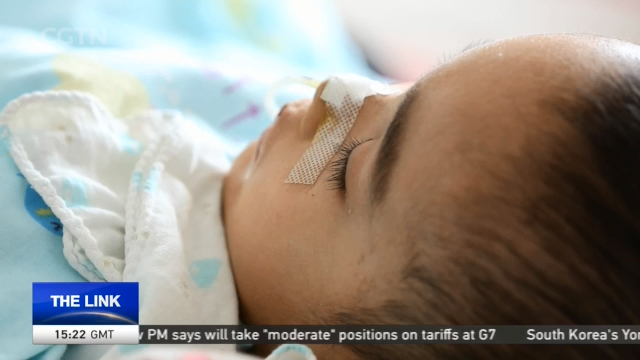
08:52, 09-Jun-2018
The Inspirers: Chinese pediatrician raises awareness of pain management
05:55

Many Chinese families prefer to evade the topic of death -- hoping its absence from conversation can somehow postpone it happening. Because of this, some parents of terminally-ill children fail to provide them with palliative care in their final days. However, one Chinese pediatrician is challenging this convention, and with goals to encourage parents to see the benefits of a comfortable and pain-free death, she is also determined to reshape the healing process for families. Ren Xueqian has the story.
Composer A.R. Rahman once said, "Music is about transporting people; speaking a language which languages fail to express."
"Dudu" is a terminally-ill five-year-old who's completely paralyzed and bed-ridden from a brain tumor. A team of oncologists and musicians are attempting to communicate with him through a "language" he understands.
DUDU'S MOTHER "Dr. Zhou introduced us to a music therapist when Dudu lost his ability to speak and move. We thought reading stories might make him happy, but for him it's music. Once there's music he starts blinking more and responds more to his surroundings."
Dudu came under the care of pediatrician, Dr. Zhou Xuan – the chief oncologist at the Beijing Children's Hospital – when his condition deteriorated in February.
Since then, Dr. Zhou and her team of pediatric palliative care specialists have been paying him regular house visits, as they try to make his days as comfortable as possible.
Similar to end-of-life care or hospice care -- where treatment is provided for individuals with six months or less to live --palliative care can be provided upon diagnosis.
Both services remain relatively new concepts in China where many families are unclear about their subtle differences.
ZHOU XUAN, CHIEF ONCOLOGIST BEIJING CHILDREN'S HOSPITAL "Many parents assume that undergoing palliative care means their child's health is near the end. Such a misconception is one of the reasons why families choose not to reach out to me until their child's condition has gotten extremely severe. Usually, by then, there's not much we can do for the patient and the family. This also explains why the majority of palliative care in China now is focused around end-of-life care."
In 2013, Dr. Zhou decided she would do something to change attitudes surrounding palliative care for children. Supported by some of her colleagues, she started making home visits for free. As her list of patients grew and workload increased, all these responsibilities presented her with another challenge.
ZHOU XUAN, CHIEF ONCOLOGIST BEIJING CHILDREN'S HOSPITAL "We realized a foundation was needed to sustain our services for the long run. We didn't have any money when we started and all of our initial donors were my old classmates, friends and colleagues. As the team grew, we now have more manpower to raise funds, but maintaining stable funding remains the biggest challenge."
Despite that, Zhou's team was able to expand their services beyond house visits. For 8-year-old Qiqi who's just entered the final stage of brain cancer, this couldn't have come at a better time. Supported by the foundation, Qiqi was moved into a special care unit after the hospital told her family to prepare for the worst. Located on the outskirts of Beijing, in an elderly hospice facility, the care unit brings a touch of home and can accommodate Qiqi and her family.
QIQI'S MOTHER "The hospital had to resuscitate my daughter, and then they suggested we bring her to a hospice care center instead. Her symptoms have stabilized since we moved here. Unlike hospitals, this care unit feels like home, which gives us all a bit more comfort."
Initially paralyzed and unable to speak, Qiqi's now able to move her hand, blink and even respond to her doctors. With this being the only palliative care unit for children in Beijing, Dr. Zhou hopes to open similar ones in the coming years. In 2015, Dr. Zhou also opened an activity center, where her patients can play games, exercise and live normally. Just ten minutes from Beijing Children's Hospital, the center is open seven days a week, and run by more than 200 volunteers.
VOLUNTEER CHILDREN'S PALLIATIVE CARE ACTIVITY CENTER "In addition to hosting weekly activities for children, we also offer therapy sessions for adults every week. All the money we receive from donations and fundraisers goes into putting these events together."
Last year, the Chinese Medical Association officially adopted "children's palliative care" as a sub-specialty in 45 public hospitals across the country. It vowed to add a specialized care team to every one of these hospitals and Dr. Zhou was asked to lead the program. Even though this meant more work, she knew she owed it to her patients to carry on the work she started.
ZHOU XUAN, CHIEF ONCOLOGIST BEIJING CHILDREN'S HOSPITAL "When I see how my patients improve after they first came to me, it brings me a sense joy and fulfilment beyond words. To me, it's not always about how many illnesses I can cure, but more of how much pain I can help take away from these children and their families. So I think I'm destined to do this job."
Ren Xueqian, CGTN, Beijing.

SITEMAP
Copyright © 2018 CGTN. Beijing ICP prepared NO.16065310-3
Copyright © 2018 CGTN. Beijing ICP prepared NO.16065310-3